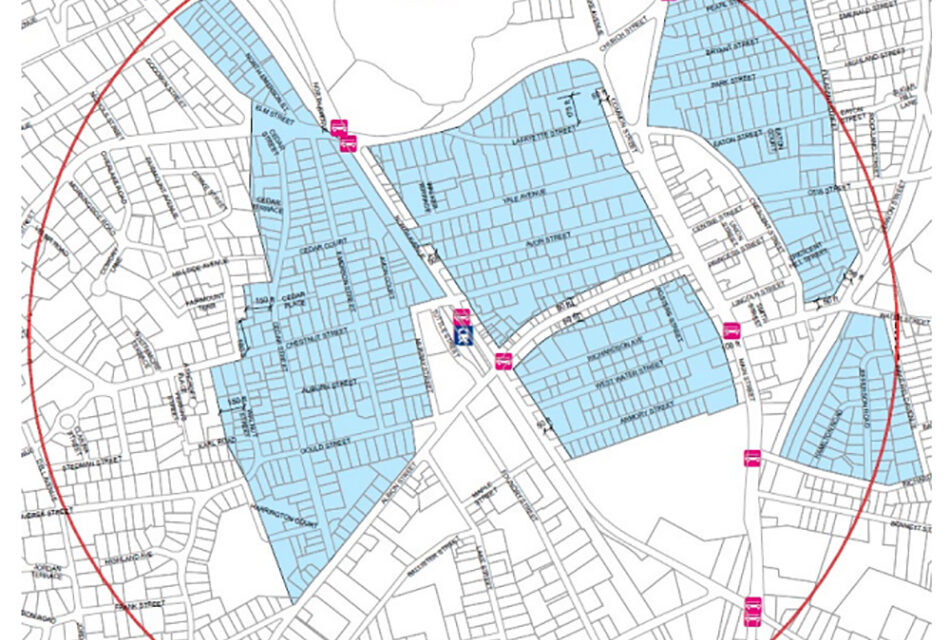WAKEFIELD – Town Councilor Ed Dombroski on Friday filed a Citizens’ Petition with a proposed Town Meeting Warrant Article related to Wakefield’s compliance with the state law known as the “MBTA Communities Act.” Councilor Dombroski’s proposal calls for Wakefield to authorize the limited number of housing units necessary to meet requirements under state law, rather than approve hundreds more, as proposed by the town’s Planning Board.
“To be clear, I strongly oppose the misguided ‘one-size-fits-all’ approach that the MBTA Communities Act is forcing upon Wakefield and other affected communities,” said Dombroski. “It is bad policy and the state is stripping us of our autonomy and local control to make development decisions best for our own town. Instead, this law gives developers the ability to massively overdevelop and build oversized multi-family buildings on lots that are too small, with infrastructure too limited, to accommodate them. This law also really does nothing to address affordable housing or senior housing – two of the biggest challenges we face today.”
In putting forth an alternative proposal, Dombroski acknowledges failure to comply with this state mandate carries significant financial consequences, leaving Wakefield with no real choice but to follow it.
Wakefield is one of 175 cities and towns designated as an “MBTA Community” by the Commonwealth due to public transportation service within the municipality. Recently enacted state legislation, commonly referred to as Chapter 40A, requires that “An MBTA community shall have a zoning ordinance or by-law that provides for at least 1 district of reasonable size in which multi-family housing is permitted as of right; provided, however, that such multi-family housing shall be without age restrictions and shall be suitable for families with children.” The zone is required to be within a half mile of public transportation. Municipalities have until December 31, 2024 to come into compliance or be cut off from multiple significant sources of state funding and face potential litigation by the Commonwealth.
Wakefield established a Working Group in Spring 2023 to assess options for creating the required Chapter 40A district. After several months, under the Planning Board’s purview, that Group issued recommendations to establish an MBTA Communities Overlay District largely within a half-mile radius of the Wakefield commuter rail station, including three zone sections in neighborhoods to the east and west of the train tracks. They also propose two additional sections in neighborhoods east of Main St., towards Pleasant St.
Based on the Chapter 40A formula, Wakefield is required to have a minimum multi-family unit capacity of 1,696 units. Currently, the Working Group estimates the town has 1,641 units, leaving a deficit of approximately 55 units. However, the recommendations of the Working Group call, in total, for adding capacity for 2,359 units, or 663 more units than the law requires.
“I appreciate the challenging work the Working Group undertook and know they were dedicated to it,” Dombroski said. “But, it is inconceivable to me that a recommendation would be made that would result in the town willingly giving up more zoning control and allowing for nearly 700 more units to be allowed to be built, as a matter of right, without any special permitting. We should meet the bare minimum requirement to comply with the law, but there is no need to exceed it.”
Input from community members to the Working Group and the Planning Board shows that residents have been overwhelmingly opposed to the recommended 2,359-units proposal, which far exceeds the state requirement. The Planning Board is sponsoring a Proposed Article for a vote at Spring Annual Town Meeting on April 29 that seeks to have the town adopt this zoning bylaw with 663 more units than the law requires. The Proposed Article also seeks to reduce off-street parking requirements from 1.5 spaces for one- and two-bedroom units and 2 spaces for three-bedroom units. Instead, the Proposed Article would require only 1.5 parking spaces regardless of bedroom size.
“It is clear to me that most residents recognize that we need to comply with this state mandate,” said Dombroski. “However, they do not support the unnecessary overreach that the Planning Board’s Proposed Article creates,” he added.
As an elected official, Dombroski has the authority to submit a proposed warrant article on his own but instead chose to submit it as a Citizen’s Petition, a process that requires registered voters to also sign-on to the effort.
Dombroski’s revised Proposed Article follows the same general format as that sponsored by the Planning Board, with three notable exceptions. First, this revised Article calls for the downsizing of the “MBTA Communities Overlay District” to only include an area that is necessary to meet the state’s minimum requirements. “If there are worthy projects for consideration in the future, especially around the downtown business district, we already have processes in place for them to be considered. This way, the town can still maintain control, rather than handing it over to outside developers,” Dombroski said.
The revised Proposed Article also restores the off-street parking ratios to their current minimums of 1.5 spaces for one- and two-bedroom units and 2 spaces for three-plus bedroom units, to the fullest extent while staying in compliance with Chapter 40A. “We’ve already seen a spillover of cars parked on our streets in many of our more densely populated neighborhoods. There’s just no reason to needlessly create more issues,” Dombroski said.
The revised Proposed Article changes the Planning Board’s language related to site plan review, by requiring in all instances public input, along with solicitation of more input from other municipal boards or officials. “This is a really unfortunate state mandate, so let’s at least put into place a process where everyone can come together to help mitigate the impacts to neighborhoods and, equally important, all feel heard,” Dombroski said.





